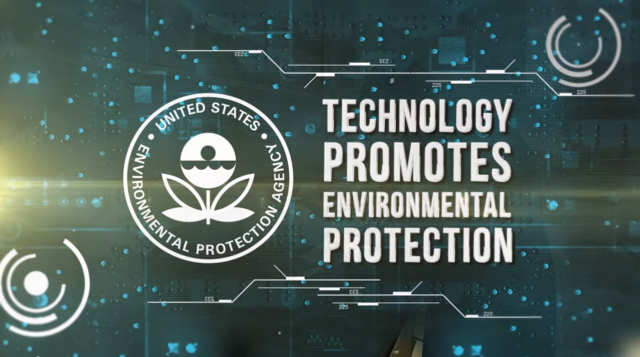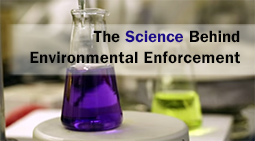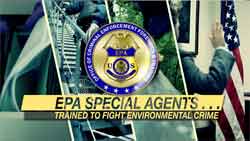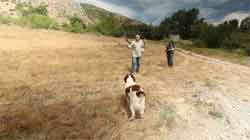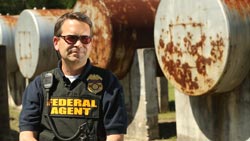Criminal Enforcement Videos
EPA Criminal Enforcement video's are available on the EPA's YouTube Channel through the links offered below.
Technology Promotes Environmental Protection - The National Enforcement Investigations Center (NEIC) is EPA's environmental forensic center. NEIC scientists and engineers work with advanced technologies to monitor, collect data and analyze pollutants that can adversely affect entire communities. These advanced technologies provide tools for scientists to measure pollutants, in near real time, and contribute to better investigative responses and a greater understanding of threats to human health and the environment.
EPA's National Enforcement Investigations Center - EPA's National Enforcement Investigations Center (NEIC) provides the scientific support behind some of the Nation's most complicated environmental enforcement cases. Take a look inside the laboratories and see how their efforts tie in to the investigative process.
Criminal Enforcement Overview - Criminal enforcement is EPA's strongest sanction and its criminal enforcement office investigates and helps the U.S. Department of Justice prosecute violators who, as a result of their intentional disregard of the law or their criminal negligence, seriously threaten public health and the environment.
EPA Special Agents: Trained to Fight Environmental Crime
EPA Special Agents are federal law enforcement officers with the full authority to conduct investigations, carry firearms, make arrests for any federal crime, and to execute search and arrest warrants. As a result, EPA Special Agents must possess a unique skill set specific to conducting environmental crimes investigations. We work with a number of federal, state and local law enforcement agencies around the country that depend on our expertise in gathering evidence associated with environmental crime.
Criminal Case Files
Joseph Coshka
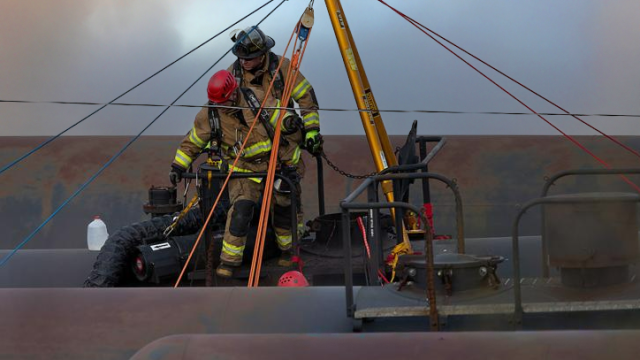
Joseph Coshka was working with two of his co-workers for Nebraska Railcar Cleaning Service when an explosion inside the railcar they were cleaning, ignited by a spark from a shovel, killed his co-workers and severely injured him. The investigation revealed that Nebraska Railcar Cleaning Service managers tested for explosive levels and knew it exceeded safe limits but falsified the reports before instructing Joseph and his co-workers to enter the tank. They were unaware the railcar they were inside cleaning contained highly flammable benzene-containing liquids. The men were not provided with personal protective equipment, nor were they provided with non-sparking tools before they were instructed to mix the waste with sawdust and place it in a dumpster to be disposed at a landfill.
Scott Dominguez

Scott Dominguez was only 20 years old when he was ordered to climb into a 25,000 gallon tank while employed at an industrial chemical reprocessing plant in Soda Springs, Idaho. Owner Allan Elias ignored requests for safety equipment and instructed Scott to climb down into the tank to clean out the sludge at the bottom. Scott did not know that the tank had once held cyanide and later, phosphoric acid. When Scott began hosing the tank down with water, it produced hydrogen cyanide gas. Lacking safety equipment, Scott was overcome and could not be carried up a ladder out of the tank. Firefighters eventually cut a hole in the side and pulled him free, but not before Scott fell victim to cyanide poisoning. He is permanently brain damaged.
The Toone family discovered a persistent rodent problem at their home in Layton, Utah. They called Bugman Pest and Lawn, Inc. to treat it. Coleman Nocks, who was a licensed commercial applicator of pesticides and employee of Bugman Pest and Lawn, Inc., applied Fumitoxin, a restricted use pesticide, at the Toone home. Nocks failed to follow the law by applying an excessive dose of the pesticide too close to the home. The poison then seeped into the Toone’s home and caused the death of 4-year old Rebecca Toone and 15-month old Rachel Toone. The defendants received probation in this case. Federal law only authorizes the use of misdemeanor charges to combat the unlawful use of pesticides, even when such unlawful use results in death. The act does not provide for felony prosecutions. However, the misdemeanor charges in this case carry the same penalty as the crime of negligent homicide available under state law.
Brent and Arlene McGregor reside in Provo, Utah. For years they had to live with a strong and unpleasant chemical smell that impacted their whole community. It was later found that a McWane pipe manufacturing company – Pacific States Cast Iron Pipe Company -- was the source of the noxious fumes. It was illegally emitting excess amounts of hazardous air pollutants and manufacturing documents to falsely suggest they were complying with the law. Their actions placed the neighboring community at risk. Pacific States was one of five McWane companies that were found guilty of environmental and/or worker safety crimes that polluted the air and water, put communities at risk, and contributed to multiple severe injuries and the deaths of at least two employees.
Employee Profiles
Special Agents
EPA Special Agent Martin Schwartz talks about his work as an EPA criminal investigator.
EPA Special Agent Andrea Abat talks about her work as an EPA criminal investigator.
EPA Special Agent Scot Adair talks about his work as an EPA criminal investigator.

